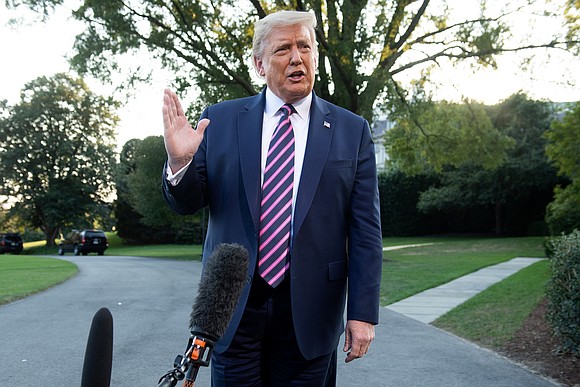How the coronavirus has defined Trump's reelection campaign
CNN/Stylemagazine.com Newswire | 9/23/2020, 7:45 a.m.

By Grace Sparks, CNN
(CNN) -- President Donald Trump hoped to make his reelection campaign about the soaring economy at the start of 2020, but the coronavirus pandemic and Trump's response to it have largely defined what Americans are hearing about the presidential campaign.
Analysis from The Breakthrough -- a project from CNN, SSRS and researchers from Georgetown University and the University of Michigan that tracks what Americans have heard, read or seen about each of the presidential candidates since early July -- shows that coronavirus was the top word mentioned in relation to the President for nine of the past 11 weeks.
Respondents are asked, "What, if anything, have you heard, read or seen in the past few days about Donald Trump?" and "What, if anything, have you heard, read or seen in the past few days about Joe Biden?" The order in which those two questions are asked is randomized.
While the pandemic has been the dominant topic associated with Trump, different aspects of it have risen and fallen in the public discourse throughout those 11 weeks. Among the different topics that have been top of mind for those surveyed are masks, expert advice, vaccines, and -- recently -- new revelations that Trump admitted to downplaying the severity of the virus at the start of the pandemic.
Through the beginning of the polling in early July, most of the focus for Trump was on mask wearing, with the word "mask" appearing in Trump's top 10 words for the first four weeks of polling. Trump said he wore a mask to a visit at a Ford plant in Michigan in late May, and his refusal to publicly wear a mask as federal public health authorities encouraged more people to wear them grabbed headlines for weeks. After its spike in early July, the word "mask" dropped lower before totally disappearing from the top 20 words associated with Trump in early to mid-August.
Another Covid-related issue near the beginning of polling in July concerned experts, including Drs. Anthony Fauci and Deborah Birx, among others. Many mentioned Fauci near the beginning of the polling project, especially in the week before July 19 when he contradicted several statements from the President about the virus. However, mentions of Fauci have now completely disappeared. His name has not made the list of the top 50 words associated with Trump in the past six weeks.
Around the time that talk of experts was decreasing, the discussion around remedies and a possible vaccine increased. Hydroxychloroquine made it into Trump's top 50 words during early August, after his son, Donald Trump Jr., tweeted a video promoting the drug as a Covid-19 treatment. The video was flagged and removed by Twitter as misinformation. On that same morning, Fauci told ABC's "Good Morning America" that clinical trials for hydroxychloroquine have shown it is not effective against the virus.
More Americans started talking about the potential to a vaccine in late August, right after Trump said the US might have an approved vaccine by the end of the year. Since then, he's claimed a vaccine will be approved as soon as late October, and vaccines have continued to make up a huge portion of coronavirus-related mentions in the poll. Public health and vaccine experts have said it is unlikely that a vaccine will be approved before the November 3 election and won't be available widely to the public until 2021.
The importance of the number of cases and deaths in the US started being mentioned more by those surveyed in early August and has remained steady. The US reached 200,000 deaths on Tuesday, after the most recent polling period had ended.
Stay at home orders were a bigger part of the conversation from mid-July to mid-August, when the country was focused on the prospect of reopening and many had concerns that some states were doing relaxing their restrictions too quickly or too slowly.
Most recently, Bob Woodward's book "Rage" has been the coronavirus subtopic most mentioned by those surveyed when talking about Trump. It went from the fifth most mentioned topic in early September to the top spot last week.
Beyond these particular subtopics, there have been a range of other coronavirus-related words and phrases that respondents have mentioned when talking about Trump. That includes any words or phrases mentioned less than 15 times for both candidates combined in the biggest week for the word. Some examples of this other category for Trump included referring to coronavirus using an offensive racial term or as a "hoax."
More than one in five of those surveyed mentioned "coronavirus" in saying what they had seen, read or heard about the President last week, and the virus was mentioned more than twice as often as the second-most oft-uttered word, "lie."
The survey also measures sentiment for both candidates, tracking positive or negative mentions for both Trump and former Vice President Joe Biden, assigning them each a number for sentiment each week.
In the most recent week of polling, Trump's sentiment stayed steady overall, but dropped significantly when only including mentions related to coronavirus. His drop can mostly be attributed to Democrats, among whom words associated with coronavirus and Trump had a much more negative sentiment that week than in the past surveys.
Republican sentiment for coronavirus regarding Trump stayed steady through a news cycle of revelations from Woodward's book, including an increase in positive sentiment in mid-August, around the Republican National Convention.
Topics related to mentions of Biden and coronavirus were more concentrated than with Trump. Respondents have focused heavily on masks when commenting on what they've heard about Biden, and it has remained one of his most mentioned topics since the beginning. Americans also referenced stay at home orders in July and testing for the virus in late August in relation to the former vice president.



